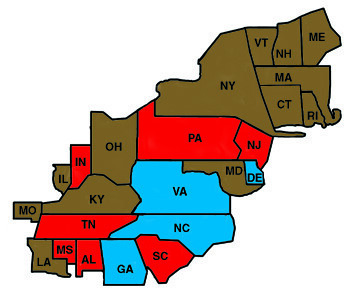| Description |
Recap of the Electoral Vote
No candidate received a majority of the electoral vote of 1824 for the office of U.S. President. The men who placed first, second, and third moved forward to the Contingent Election.
Since the electoral vote result was well known long before it was counted in the joint session, the politicians had ample opportunities to jockey for position. Crawford was the weakest, partially because he still had not recovered from his stroke of 1823. Andrew Jackson approached Henry Clay, the Speaker of the House who had been eliminated from the presidential contest, and offered him the office of Secretary of State in exchange for his support in Kentucky and Missouri. Clay declined the offer, privately making it clear that he considered Jackson unfit for the presidency. He later chose to support Adams, who went on to appoint him Secretary of State.
The Contingent Election
 The U.S. House held the contingent election on 2/9/1824. At the end of the joint session of Congress, the U.S. Senators departed. Henry Clay asked that the Representatives sit as delegations temporarily. All members of the House were present except one (who was ill). Each delegation was handed a ballot box, into which the representatives from that state cast their votes.
The U.S. House held the contingent election on 2/9/1824. At the end of the joint session of Congress, the U.S. Senators departed. Henry Clay asked that the Representatives sit as delegations temporarily. All members of the House were present except one (who was ill). Each delegation was handed a ballot box, into which the representatives from that state cast their votes.
The House appointed Daniel Webster and John Randolph to serve as tellers. They took the ballot boxes and counted the vote of each state, determined if any candidate had a majority of that state, and assigned the one vote of the state to a candidate. Altogether, 87 members voted for Adams, 71 for Jackson, and 54 for Crawford. Adams's vote was concentrated, and he ended up with the vote of 13 states. Jackson won the vote of seven states, and Crawford won four. Spectators in the galleries cheered as the results were being read, and Clay suspended the proceedings until the galleries had been cleared.
The results were read again. Clay declared that "John Quincy Adams having a majority of the votes of these United States, was duly elected President of the same."
| Balloting in the Contingent Election of 1825 |
| State | Vote | Adams Vote | Jackson Vote | Crawford Vote |
| AL | J-3 | | McKee, Moore, Owen (3) | |
| CT | A-6 | Barber, Foote, Sterling, Stoddard, Tomlinson, Whitman (6) | | |
| DE | C-1 | | | McLane (1) |
| GA | C-7 | | | Abbot, Cary, Wilde, Cuthbert, Forsyth, Tattnall, Thompson (7) |
| IL | A-1 | Cook (1) | | |
| IN | J-3 | | Jennings, Test, Call (3) | |
| KY | A-8, J-4 | Buckner, Clay, F. Johnson, Letcher, Metcalfe, Thompson, Trimble, White (8) | Henry, J Johnson, Moore, Wickliffe (4) | |
| LA | A-2, J-1 | Brent, Gurley (2) | Livingston (1) | |
| ME | A-7 | Burleigh, Cushman, Herrick, Kidder, Lincoln, Longfellow, O'Brien (7) | | |
| MD | A-5, J-3, C-1 | Kent, Mitchell, Neale, Spencer, Warfield (5) | Lee, Little, McKim (3) | Heyward (1) |
| MA | A-12, J-1 | Allen, Bailey, Crowninshield, Dwight, Fuller, Hobart, Lathrop, Locke, Nelson, Reed, Sibley, Webster (12) | Baylies (1) | |
| MS | J-1 | | Rankin (1) | |
| MO | A-1 | Scott (1) | | |
| NH | A-6 | Bartlett, Harvey, Livermore, Matson, Plumer, Whipple (6) | | |
| NJ | J-5, A-1 | Matlack (1) | Cassedy, Condict, Garrison, Holcombe, Swan (5) | |
| NY | A-18, C-14, J-2 | Adams, Cady, Hayden, Herkimer, Lawrence, Martindale, Marvin, Woods, Rose, Sharpe, Storrs, Strong, Taylor, Tracy, Van Rensselaer, Van Wyck, Williams, Wood (18) | Craig, Morgan (2) | Cambreleng, Clark, Collins, Day, Dwinell, Eaton, Foote, Frost, Hogeboom, Jenkins, Litchfield, Richards, Ten Eyck, Tyson (14) |
| NC | C-10, J-2, A-1 | Culpepper (1) | Connor, Vance (2) | Outlaw, Edwards, Gatlin, Hall, Hooks, Long, Mangum, Saunders, Spaight, Williams (10) |
| OH | A-10, J-2, C-2 | Bartley, Beecher, McArthur, McLean, Patterson, Sloane, Vance, Vinton, Whittlesey, Wright (10) | Campbell, Gazlay (2) | Ross, Wilson (2) |
| PA | J-25, A-1 | Breck (1) | Allison, Brown, Buchanan, Edwards, Ellis, Farrelly, Findlay, Forward, Harris, Hemphill, Ingham, Kremer, McKean, Markley, Miller, Mitchell, Patterson, Plumer, Stewart, Thomson, Udree, Wayne, H Wilson, J Wilson, Wolf (25) | |
| RI | A-2 | Durfee, Eddy (2) | | |
| SC | J-9 | | Campbell, Carter, Gist, Govan, Hamilton, McDuffie, Poinsett (9) | |
| TN | J-9 | | Alexander, Allen, Blair, Cocke, Houston, Isacks, Reynolds, Sandford, Standifer (9) | |
| VT | A-5 | Bradley, Buck, Crafts, Mallary, Olin (5) | | |
| VA | C-19, A-1, J-1
Absent-1 | Newton (1) | Johnson (1) | Alexander, Archer, J Barbour, P Barbour, Bassett, Floyd, Leftwich, McCoy, Mercer, Randolph, Rives, A Smith, W Smith, A Smyth, Stephenson, Stevenson, Taliaferro, Tucker, Williams (19) |
When Adams appointed Clay as his Secretary of State (and heir apparent), Andrew Jackson was furious. Although Jackson won a plurality of the electoral vote, he was not guaranteed the presidency. He resigned from the U.S. Senate, charged Adams and Clay of making a "corrupt bargain," and began his campaign for the 1828 election. In 1826, Jackson supporters started collecting the results of the popular vote from the various states - the first time this had been done - to show that Jackson was indeed the "people's choice."
Popular Vote of 1824
Contingent Election of 1825 |

